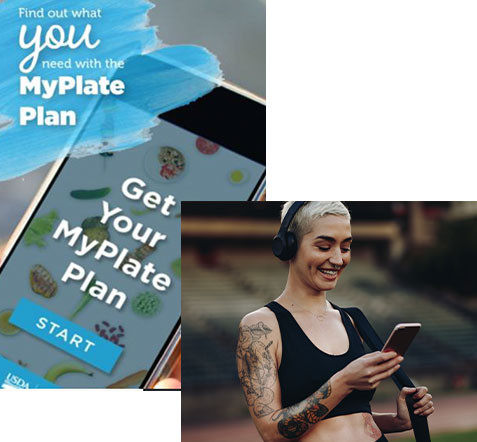As you age, keeping healthy habits may help you lower your chance of getting certain diseases like cancer, diabetes, heart disease, and high blood pressure (hypertension). Make healthy eating a priority and stay active.
![]()
![]()
![]()
![]()
![]()
![]()

As you age, manage our calories to stay at a healthy weight. This will help you prevent weight gain over time. Find the amount of calories right for you using the MyPlate Plan.
Jogging, playing team sports, and biking are just a few examples of how you can stay active. Every little bit helps. Just remember to move more and sit less! Learn more in this Move Your Way Fact Sheet for Adults.
Get MyPlate nutrition information straight to your home on your Amazon Alexa smart speaker, or on your phone or tablet via the free Amazon Alexa app. For more information, visit our MyPlate Alexa page.
Below are some of the many tips available for adults. And just like the MyPlate.gov website and MyPlate tools, all of the information provided by MyPlate on Alexa is based on the Dietary Guidelines for Americans, 2020-2025.
The nutrients in dairy are important for all ages. Include foods like low-fat or fat-free dairy milk or yogurt. Need an alternative? Try lactose-free dairy milk or yogurt that's low-fat or fat-free. You can also try fortified soy versions.
Serve up variety. At your next event, create a colorful buffet table that includes a variety of foods from all the food groups.
Get creative with beans, peas, and lentils. Make chili or stews with kidney or pinto beans, a bowl of split pea soup for lunch or dinner, or lentils as a side dish. Check online for recipe ideas.
Perk up plain water or seltzer water with lemon, lime, or orange slices. Maybe even add some fresh mint leaves or a few fresh or frozen berries.
Move to low-fat or fat-free dairy milk or yogurt, or lactose-free dairy or fortified soy versions.
Share dessert with someone else. Half a pastry or slice of cake means only half the added sugars (and calories) for each of you.
Look for cue words. Items that are “pickled,” “brined,” or “cured” tend to be high in sodium. Include these foods in your meals sparingly.
Start your meal with veggies. If you start your meal with a salad or eat your vegetables first, you will feel full sooner and ensure that you get valuable vegetable nutrients.
Eat nuts, seeds, and fatty fish like tuna, salmon, and sardines. These foods, as well as vegetable oils like olive and canola, are good sources of unsaturated fat, which is a healthier fat option.
Switch up pizza night. Create individual, homemade pizzas on whole-wheat English muffins or tortillas. Or, make a traditional pizza using a pre-made whole-wheat flour. Don’t forget the veggie toppings.